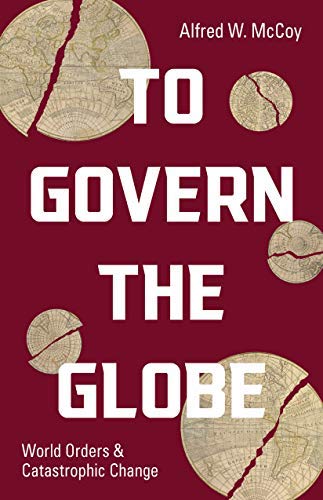Book Review: “To Govern the Globe” — An Epic History of World Hegemony
By Ed Meek
Alfred McCoy’s brilliant history examines the evolution of world orders leading up to Pax Americana and the current decline of the United States.
To Govern the Globe, World Orders and Catastrophic Change by Alfred W. McCoy. Haymarket Books, 380 pages, $23.16 (hardback).
 To better understand what is going on in the world these days, as well as how we got here and where we’re going, get a copy of Alfred McCoy’s brilliant new book To Govern the Globe. The author of 2009’s well-received Policing America’s Empire takes on the challenge of covering the last 800 years from the perspective of the rise and fall of empires. More importantly, he examines the evolution of world orders leading up to Pax Americana and the current decline of the United States. McCoy describes convincingly the coming dominance of China and the world-wide problem of climate change that will undermine China’s future as we collectively attempt to survive a hostile environment — one that we’re beginning to understand the serious nature of as we witness wildfires, flooding, droughts, hurricanes, record heat, shifting seasons, and climate refugees.
To better understand what is going on in the world these days, as well as how we got here and where we’re going, get a copy of Alfred McCoy’s brilliant new book To Govern the Globe. The author of 2009’s well-received Policing America’s Empire takes on the challenge of covering the last 800 years from the perspective of the rise and fall of empires. More importantly, he examines the evolution of world orders leading up to Pax Americana and the current decline of the United States. McCoy describes convincingly the coming dominance of China and the world-wide problem of climate change that will undermine China’s future as we collectively attempt to survive a hostile environment — one that we’re beginning to understand the serious nature of as we witness wildfires, flooding, droughts, hurricanes, record heat, shifting seasons, and climate refugees.
Reading about the conflicts of the last eight centuries, you might come away with the feeling that those of us residing in Europe and North America have been experiencing a brief utopian interlude. The norm is a constant state of war and conflict. The invasion of Ukraine by Russia fits right into a history of imperial conquest; it is also a response to the break-up of the Soviet Union and the wars, proxy wars, and CIA actions conducted by the US in the Middle East and Southeast Asia. This is not to justify Russia’s catastrophic attempt to reclaim Ukraine. McCoy helpfully provides us with some perspective on the game of thrones played by powerful countries through history. As Circe said to Ned just before he lost his head, “You win or you die.”
According to McCoy, world orders are “deeply rooted, resilient global systems created by a convergence of economic, ideological, and geopolitical forces.” These may begin with an empire but often live on after it and they also tie into our evolving views of human rights and sovereignty. McCoy claims “there have been just three world orders: the Iberian age after 1494, the British imperial era from 1815, and Washington’s world system from 1945.” He also makes the case that the coming world order will belong to China, beginning around 2030.
World orders, explains McCoy, have come into existence because of some combination of terrible events like pandemics or major wars that create a power vacuum combined with new developments in labor, technology, and weapons. The Iberian Age was partly engendered by the advent of The Black Death that swept east from Asia causing the demise of 60% of Europe’s population. During that period the Portuguese and the Spanish built small, swift ships capable of sailing long distances. The Portuguese sailed south, establishing ports in Africa and around the horn to the Indian ocean and Asia and on to China. The Spanish, as well as the Portuguese, headed west to America. These adventurers were religious zealots given the green light by the Pope to enslave all heathens. They bought captives from Africa and shipped them to the Caribbean and North America, creating a world order that depended on slavery to power economies based on sugar and cotton. The Portuguese and Spanish were brutal in their treatment of Africans, Incas, and Aztecs — superior weaponry was used to enslave Africans and to plunder gold and silver from the Incas and Aztecs.
Eventually they lost control of their empire when the Dutch, harnessing the wind to drive windmills and building better ships for warfare, defeated the Spanish Armada and established the first international corporation in the Dutch East India Company. They in turn were replaced by the British, who developed the steam engine and coal mining which led to the Industrial Revolution and the defeat of Napoleon, ending his short-lived empire. This began the second world order and jump-started climate change.
Because of the industrial revolution, the British no longer needed slavery and they took a moral stance outlawing the slave trade in 1804. They began seizing ships and freeing the captives. At the same time, they developed a navy superior to the Spanish and the Dutch and began spreading their empire around the globe. They focused on colonizing countries in Africa, India, North America, Australia, and New Zealand. Their arrogant attitude: colonists were second class citizens subject to rule by the British Empire.

Author Alfred W. McCoy, Professor of History at the University of Wisconsin–Madison. Photo: Common Dreams.
The sun finally set on the British empire during World War 11. While the rest of the world suffered 77 million casualties, the United States continued to grow, emerging as the most powerful nation. After the war, the US helped draft “the UN Charter that promised its peoples the freedom to form their own states … and universal human rights.” This was America’s finest moment — promoting freedom and individual rights around the globe.
At the same time, the US, like all of the preceding empires, engaged in sharp-elbowed geopolitics in order to establish global hegemony. Geopolitics, McCoy tells us is “the use of geography (air, land, and sea) to maximize military and economic advantage.” The US, following in the footsteps of past empires, stationed its navy and its troops strategically around the world, from Europe to the Middle East and Southeast Asia. A major goal was to maintain open markets for the flow of goods.
Whenever threats to the empire appeared to be developing, the US used the CIA to depose objectionable leaders. These interventions did not often work out well. We replaced elected pro-communist Mossadegh in Iran with a pro-western Shah that generated the anti-American sentiment that continues today. McCoy points out that we fomented Muslim unrest in central Russia and that contributed to Russia’s invasion of Afghanistan, leading to the collapse of the Soviet Union. Like the British, French, and Portuguese before us, we rushed into faraway wars that wasted lives and treasure in Vietnam, Iraq and Afghanistan.
Thinking we could free the world with global trade, we opened markets to Russia and China. Rather than proving mutually beneficial, both countries — China in particular — exploited the weaknesses of capitalism. The idea was to control and take over markets. China used its enormous profits to expand its economic and geopolitical power through the Belt and Road Initiative, cultivating business in Africa as it linked Asia to Europe and Russia. McCoy predicts that China has made the right moves: it will supplant the US by 2030 as the number one economy and power in the world.
Now Putin has disturbed this scenario by invading Ukraine with the murderous frenzy of a 19th century imperialist.
The somewhat surprising result is that the US and NATO have reaffirmed their alliance, the latter pledging to build up their military. Perhaps the US and Europe have more of a future than McCoy predicts.
If McCoy is right about China, the transition will not be easy because the Chinese have a much different world view than the United States. They prioritize their economy and centralized power, like us, but they do not prize individual freedom or human rights. Nor do they approve of open oceans or free trade. McCoy thinks their hegemony will be short-lived though, because of the growing tragedies of climate change. 57% of China’s energy comes from coal. The connection between coal mining and electricity, begun by the British in the Industrial Revolution, remains strong in China, India, and Australia. Through the twentieth century the US helped to develop the global hunger for coal, oil and gas. Fossil fuels may have led to better lives and prosperity for millions of people around the world, but they have heated up our atmosphere and our oceans creating climate problems that the prime offenders, China and the US, do not appear to be willing to take on.
McCoy makes dire predictions about how bad conditions for the earth and humanity will be by 2050 based on studies by thousands of scientists. China’s “win” will be short-lived because of massive flooding of many of its major seacoast cities: “Beijing’s hypernationalist hegemony will have just a couple of decades of dominance before it too begins to suffer the calamitous consequences of unchecked global warming.” The glimmer of hope lies with those willing to make the changes necessary for the survival of humans, animals, and vegetation. To Govern the Globe can be read as a clarion call to take action.
Ed Meek is the author of High Tide (poems) and Luck (short stories).

Thanks for this. I’ll read it. Haymarket once again out front.